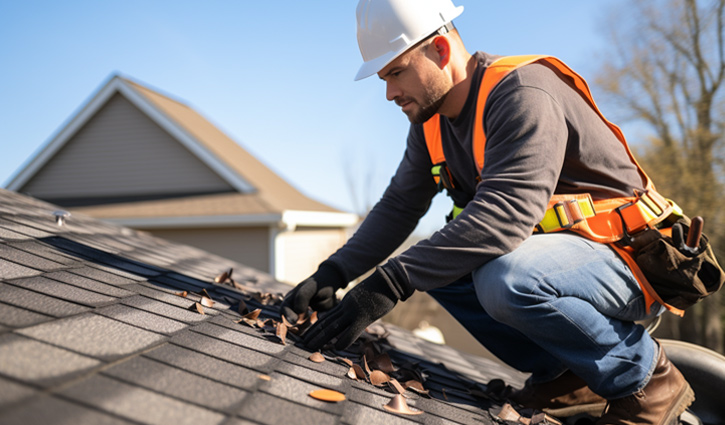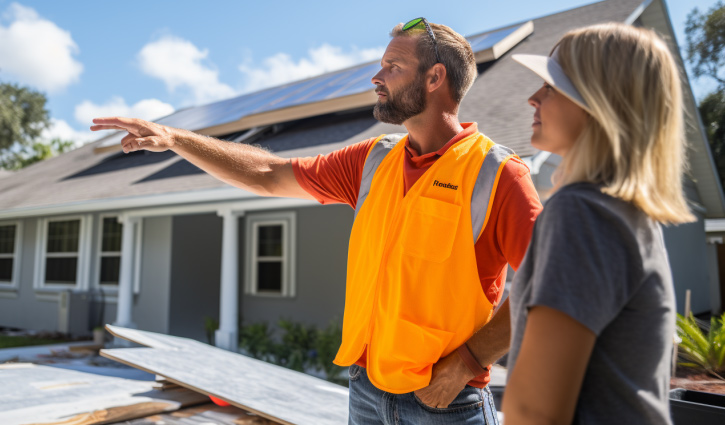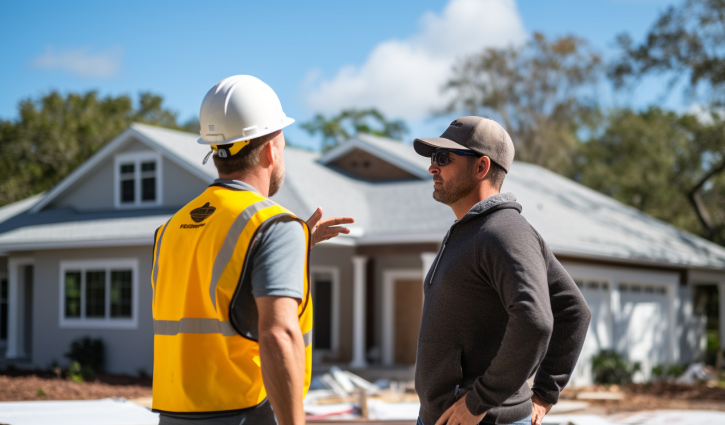A new roof is a significant investment, and knowing how to choose a roofing contractor can make all the difference in the quality and longevity of your new roof. In this comprehensive guide, we’ll walk you through the process of evaluating your roofing needs, researching potential contractors, comparing estimates, and communicating effectively to ensure a successful outcome. Let’s begin your journey to finding the best roofing contractor for your project.

Key Takeaways
- Understand your roofing needs and conditions before selecting a contractor.
- Research contractors, assess materials & energy efficiency, and compare estimates/bids to get the best outcome.
- Prepare home for the project, review the contract, and confirm insurance/permits prior to commencement.
Understanding Your Roofing Needs
Before you start your search for a roofing contractor, take the time to familiarize yourself with your roofing needs. This includes evaluating the current state of your roof, selecting the appropriate material, and considering energy efficiency for long-term benefits.
We’ll break down these aspects further to assist you in making an informed decision.
Assess the Condition of Your Roof
The first step in understanding your roofing needs is to determine if your roof requires roofing repairs or a complete replacement. If your roof is over two decades old, opting for a roof replacement project may be more cost-effective. However, always consult with multiple roofing contractors before making a decision. Additionally, be aware of any underlying issues that could impact the project, such as the presence of asbestos roofing, which could extend the duration and increase the cost.
When choosing a roofing contractor, consider both independent local roofing contractors and roofing companies. A roofing company typically excels in larger projects like replacements, offering cost savings, expedited completion, and guarantees. On the other hand, independent contractors often provide a single point of contact and may be more experienced in smaller projects like repairs.
Choose the Right Roofing Material

Selecting a suitable roofing material significantly impacts the durability and aesthetics of your roof. Popular options include asphalt shingles and cedar shingles. Don’t forget to account for the materials beneath the shingles, such as the roof deck (if damaged), water shield, and underlayment, which will need to be replaced.
If you prefer a certain type of roofing, finding a specialist is crucial for the correct installation. Cost is another factor to consider: metal roofing is generally more expensive than asphalt shingles or tiles. Comparing multiple estimates will help you choose the most cost-effective option for your project.
Consider Energy Efficiency
Opting for energy-efficient roofing materials and insulation can reduce energy costs and improve your home’s overall performance. Energy-efficient roofing materials include:
- Tile roofs (made from slate, clay, or concrete)
- Metal roofs
- Asphalt roofs
- Slate shingles
- Green roofs
Solar reflective roofing, designed to reflect sunlight and absorb less solar energy, contributes to energy efficiency by decreasing heat transfer into the building and reducing cooling costs.
In most areas, a building permit is necessary for all roofing, excluding repairs totaling less than 100 square feet. Ensuring permits are obtained and insurance coverage is in place can protect you and the contractor in case of accidents or damages.
Researching Potential Roofing Contractors
Once you’ve comprehended your roofing needs, begin your research to find prospective roofing contractors. Reading online reviews, requesting references, and verifying licenses and insurance are crucial to finding a reputable, experienced contractor.
We’ll examine these aspects further to guide you in making the ideal choice for your project.
Read Online Reviews

Online reviews offer invaluable insights into a contractor’s work, helping you make an informed decision. Consult websites such as:
- Yelp
- HomeAdvisor
- Angie’s List
- Better Business Bureau
- GuildQuality
To gather unbiased opinions. Keep in mind the overall rating, read multiple reviews, consider the number of reviews, look for specific details, check for consistency, and consider the credibility of the review source.
Remember that when looking at contractor reviews:
- Higher ratings generally indicate better service and customer satisfaction
- A larger number of reviews can provide a more accurate representation of a contractor’s work
- Focus on comments about the high quality of work, professionalism, communication, timeliness, and any resolved issues.
Ask for References
Requesting a list of previous clients from potential contractors allows you to evaluate their work quality and professionalism. Aim for at least three references from prior clients. Ask these clients about the contractor’s ability to fulfill the job to their satisfaction, their punctuality, and how they managed any delays that may have occurred.
Also, consider asking for references from projects that the contractor has completed in the past 3-6 months to gauge their current work quality. It is important to request references from a contractor. If they refuse to provide them, you should take it as a sign that another contractor may be a better choice.
Verify Licenses and Insurance
Ensuring that your roofing contractor has the necessary licenses and insurance coverage is essential to protect both parties in case of accidents or damages. State credentials, insurance, and industry credentials are necessary credentials a roofing contractor should possess in the roofing industry.
General liability insurance protects your home if the contractor causes damage during the project, while workers’ compensation insurance covers injuries to workers on the job. Verify these coverages before work begins to safeguard your investment and avoid potential liability issues.
Comparing Estimates and Bids
Following your contractor research, proceed to compare estimates and bids. This involves analyzing price structures, examining provided services, and studying warranties to make a well-informed decision. We’ll dissect these factors further to guide you in selecting and hiring the right contractor for your project.
Analyze Price Breakdowns
Cross-checking estimates from various contractors is crucial in identifying the most affordable solution for your roofing project. Focus on the cost of materials, labor, and additional services. Labor costs in roofing projects can be estimated by multiplying the project’s total square footage by the labor rate per square foot or summing the hourly rates of the workers involved.

Take note of any discrepancies in the line items on each estimate, and ensure that the same information is present, regardless of the brand or manufacturer. This will help you choose a contractor that offers quality materials and workmanship at a reasonable price.
Evaluate Services Offered
Beyond price analysis, reviewing the variety of services each contractor provides is necessary. A roofing contractor should offer services such as:
- Roof Inspection
- Repairs
- Restoration
- Replacement
- Installation
- Cleaning
Some contractors may also offer additional services like gutter installation, siding repair, or window replacement, providing a comprehensive solution for their clients’ home improvement and roof repairs.
By considering the range of services offered by local roofing companies, you can select the best, well-equipped contractor to handle your good roofing project and any additional needs that may arise during the process. To ensure a successful outcome, choosing a good roofing contractor with a proven track record of delivering high-quality work is crucial. Among the reputable roofing contractors in your area, make sure to select the one that aligns with your specific needs and requirements.
Review Warranties
Finally, examining the workmanship and material warranties offered by each contractor is crucial to ensure long-term protection for your investment. Workmanship warranties cover the cost of labor and materials required to make essential repairs in the event of contractor installation errors or improper installation. Material warranties, on the other hand, cover defects in the roofing materials themselves but typically do not cover issues caused by improper installation.
By reviewing warranties, you can make an informed decision and select a contractor that offers comprehensive coverage for both workmanship and materials, safeguarding your investment and ensuring the long-term security of your roof.
Communicating with Roofing Contractors
Effective communication is key to ensuring a successful roofing project. Discussing project details, addressing concerns and questions, and monitoring progress are all essential aspects of the communication process. Let’s dive into these factors to guarantee a smooth and satisfactory outcome.
Discuss Project Details
Clearly communicating your expectations, timeline, and budget with the roofing contractor is vital to avoid misunderstandings. Provide the contractor with as much information as possible about any roofing issues, previous repairs, or damage, and arrange an appointment for them to assess your roof if necessary.
Ensure that you have a clear understanding of the project’s scope, including:
- the materials to be used
- labor costs
- cleanup and disposal of debris
- warranty information
- payment terms
- project timeline
Discussing these details upfront will help ensure that both you and the contractor are on the same page and can avoid potential issues down the line.
Address Concerns and Questions
Don’t hesitate to ask the contractor about their experience, safety measures, and potential challenges they may face during the project. Inquiring about their qualifications, insurance coverage, and any complaints they have had from previous clients can provide valuable insights into their professionalism and reliability. Make sure to prepare a list of important questions to ask before starting the conversation.

By addressing your concerns and questions, you can ensure that the contractor is well-equipped to handle your project and prioritize customer satisfaction. This will also help you build trust and develop a strong working relationship with the contractor, ultimately leading to a better outcome for your roofing project.
Finalizing the Contract and Preparing for the Project
Before commencing the work, a few last steps are required, such as contract review, insurance and permit confirmation, and home preparation for the roofing job. We’ll walk through these steps to guarantee your readiness for the project.
Review the Contract
Thoroughly read and understand the contract, ensuring it includes all necessary details, such as payment terms, materials, and project timeline. This will help you avoid any misunderstandings or unexpected changes during the project. If you have any questions or concerns about the contract, don’t hesitate to discuss them with the contractor to ensure that both parties agree on the terms and conditions.
By reviewing the contract carefully, you can ensure that all agreements, changes, and discussions with the contractor are documented, preventing misunderstandings and providing a reference point should any issues arise during the project.
Confirm Insurance and Permits
Before the project starts, ensure the contractor has secured the necessary permits and insurance coverage. Confirming this information is crucial to protect both you and the contractor in case of accidents or damages. If the contractor recommends forgoing permits, consider looking for another contractor, as this could lead to potential issues down the line.
Ensuring that the contractor has the proper insurance coverage, such as general liability and workers’ compensation insurance, will safeguard your investment and prevent potential liability issues should any accidents occur during the project.
Prepare Your Home for Roofing Work
Before starting the roofing job, perform the required preparations for your home and its vicinity. Clear any debris, furniture, or other items from the area surrounding the roof to facilitate the roofing work. Cover outdoor furniture, plants, or other items that could be affected by the roofing process.
Informing your neighbors about the upcoming roofing work is a courteous gesture and can help maintain good relations with those living nearby. By taking these steps, you can ensure a smoother and more efficient roofing process, leading to a successful outcome for your project.
Monitor Progress and Provide Feedback
Staying involved throughout the project and providing feedback is essential for a successful outcome. Here are some steps to follow:
- Familiarize yourself with the job scope and monitor the contractor’s progress to ensure they are adhering to the project requirements.
- Maintain regular communication with the contractor to address any potential issues.
- Provide feedback on their work as needed.

Taking an active role in the project and addressing any concerns promptly and clearly will help ensure that the contractor delivers quality workmanship and meets your expectations. By maintaining open lines of communication, you can address any issues that may arise and guarantee a smooth and satisfactory conclusion to your roofing project.
Summary
Choosing the right roofing contractor is essential for a successful roof replacement or repair project. By understanding your roofing needs, researching potential contractors, comparing estimates and bids, effectively communicating with the contractor, and finalizing the contract and preparations, you’ll be well-prepared to make an informed decision. By hiring the right contractor and having a clear plan in place, you can enjoy a high-quality and long-lasting roof that will protect your home for years to come.
Frequently Asked Questions
How do I pick a roofer in Florida?
To pick a quality roofer in Florida, check for their licenses and insurance coverage and read reviews and references. Avoid out-of-town doorknockers and storm chasers, and make sure the roofers practice safety on your roof. Ask about unplanned repairs and materials, and get multiple price quotes.
Who is the best roofing company in the United States?
The determination of the “best” roofing company can vary depending on specific criteria, such as location, the type of roofing services needed, customer reviews, and other factors.
What is the best part of being a roofer?
As a roofer, you can enjoy the variety of work sites, make a living wage, pick up new technical skills, and even enjoy working outside seasonally – making the best part of being a roofer the potential for professional growth in an ever-growing industry.
How to choose a roofer?
When choosing a roofer, consider local contractors, read reviews, compare estimates, and review references to see previous work for quality assurance.
How do I determine if my roof needs repair or replacement?
To determine if your roof needs repair or replacement, consult with roofing contractors to evaluate the condition and follow their recommendations.